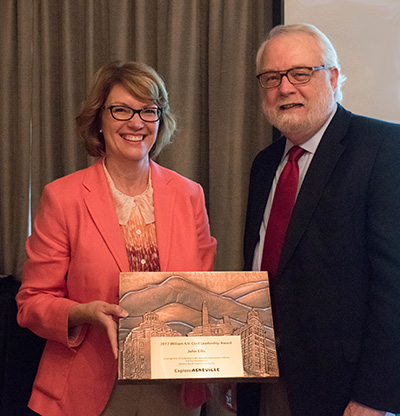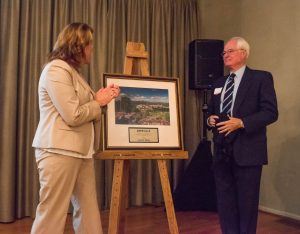The Buncombe County Tourism Development Authority (BCTDA) honored local business leaders during its 2017 Annual Meeting at the Omni Grove Park Inn on September 13, 2017.
The William A.V. Cecil Award was presented to John Ellis, retired executive director of the Diana Wortham Theater, in recognition of his contributions to the development of the arts in Western North Carolina. Created in 1999, the award honors leadership, creativity and commitment of the people who have made it their mission to help guide the tourism industry in Buncombe County
 The Diana Wortham Theater is a Western North Carolina cultural icon hosting more than 200 public events each year with attendance exceeding more than 50,000 annually. Through Ellis’ leadership and innovation, The Mainstage Series was created—bringing national touring acts to Asheville for more than 587 performances to the enjoyment of 186,000 attendees. During his tenure, the theater established a matinee series and The Youth Education Scholarship Fund to make the arts accessible to the children of Western North Carolina.
The Diana Wortham Theater is a Western North Carolina cultural icon hosting more than 200 public events each year with attendance exceeding more than 50,000 annually. Through Ellis’ leadership and innovation, The Mainstage Series was created—bringing national touring acts to Asheville for more than 587 performances to the enjoyment of 186,000 attendees. During his tenure, the theater established a matinee series and The Youth Education Scholarship Fund to make the arts accessible to the children of Western North Carolina.
“As the former director of a performing arts attraction in this community, I want to thank and recognize the foresight and leadership of the tourism industry, with Mr. Cecil at the forefront, who more than 30 years ago created a mechanism to generate the necessary resources to promote and develop this market,” Ellis said, expressing how rewarding it was to be a part of downtown Asheville’s revitalization and growth over the past 20 years.
Ellis also recognized local businesses for their philanthropic support of the community. “I have gained a tremendous amount of respect for the tourism industry and all it does for the community, directly and indirectly through philanthropy and public service, with special respect for the restaurant industry their support of MANNA, Welcome Table, and nearly every organization hosting a benefit in this town.”
Ellis has been a BCTDA board member for six years, instrumentally guiding the development of the Tourism Product Development Fund — serving on that committee from 2006 to 2015 and chairing the committee in 2009, 2010 and 2012. The TPDF grant program has become one of the most significant sources of support available to non-profits in the Asheville community. Since inception, the BCTDA has awarded $30 million to 32 community projects.
 The board also recognized Biltmore Vice President of Sales Paula Wilber for her leadership of the BCTDA. Wilber has been on the board for six years. She became vice chair in 2013 and was elected as the first female chair of the BCTDA in 2015. She guided the implementation of the largest marketing expansion in the BCTDA’s history, a move that included advertising in 15 markets from Washington D.C. to Cincinnati to the tip of Florida – resulting in an unprecedented increase in lodging sales and visitor spending for the Asheville destination.
The board also recognized Biltmore Vice President of Sales Paula Wilber for her leadership of the BCTDA. Wilber has been on the board for six years. She became vice chair in 2013 and was elected as the first female chair of the BCTDA in 2015. She guided the implementation of the largest marketing expansion in the BCTDA’s history, a move that included advertising in 15 markets from Washington D.C. to Cincinnati to the tip of Florida – resulting in an unprecedented increase in lodging sales and visitor spending for the Asheville destination.
At Biltmore, Wilber oversees all group and event sales, ticketing and reservations. Biltmore has been a key partner and supporter of the convention and visitors bureau, hosting the industry for many events including two annual meetings. Biltmore is America’s Largest Home, built by George W. Vanderbilt in 1895, which attracted more than 1.4 million visitors last year.
“Paula has led this organization during an unprecedented time of growth and progress,” Stephanie Brown, president and CEO of Explore Asheville, said. “She has done it with endless good humor and dignity, and we are grateful for her leadership.”
 In alignment with industry best practices, BCTDA established the convention and visitors bureau as an independent entity on July 1, 2017. The new organization – Explore Asheville Convention & Visitors Bureau – relocated to new office space shared with partner organizations, the Asheville Independent Restaurant Association (AIR) and the Asheville Buncombe Regional Sports Commission (ABRSC).
In alignment with industry best practices, BCTDA established the convention and visitors bureau as an independent entity on July 1, 2017. The new organization – Explore Asheville Convention & Visitors Bureau – relocated to new office space shared with partner organizations, the Asheville Independent Restaurant Association (AIR) and the Asheville Buncombe Regional Sports Commission (ABRSC).
Each year, Buncombe County welcomes 3.3 million overnight guests, providing a customer base that assists in the sustainability of businesses in the community and contributes to tax revenues. Annually, tourism generates a $2.6 billion economic impact to the region.
